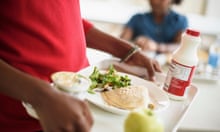As pupils go back to school this week, concerns are growing over the future of the government’s programme to provide free nutritious hot meals to four- to seven-year-olds.
As part of the chancellor’s autumn spending review, in which all areas of public expenditure are in scope for cuts, the Department for Education will be drawing up detailed plans for making savings. Although overall school funding, including pupil premium rates, will be protected on a per-pupil basis, the budget for the universal infant free school meals programme is not ringfenced.
Already, two DfE-funded projects to help schools increase their dinner takeup have been scrapped, with the department saying they didn’t offer value for money.
And last week, celebrity chef Jamie Oliver admitted he had failed over school meals. Oliver’s 2005 Feed Me Better Campaign and his documentary, Jamie’s School Dinners, helped convince the then Labour government of the importance of nutritious lunches for pupils. “I admit I haven’t succeeded, mainly because I haven’t single-mindedly gone for it,” he told the Radio Times. “In Britain, eating well and feeding your kid right and being aware about food is all considered very posh and middle class.”
Part of the problem is cost, with heads struggling to keep meals nutritious within budget. In 2013 deputy prime minister Nick Clegg announced the introduction of the free school meals programme to all pupils in reception, year 1 and year 2, to be rolled out from September 2014. The government pays £2.30 a meal based on how many pupils eat school lunches on a given “census” day. So getting as many pupils as possible in front of plates on that date matters.

“It’s mad – you’re trying to maximise your school income, and if you have to put chips, fish fingers and pizza on the menu on census day to make sure everyone has a dinner and gets counted, then that’s what you do,” says headteacher Emma Payne.
The Guardian has been following the school dinner fortunes of Payne’s school, St Mary Redcliffe primary in Bristol, since March 2014. One indirect consequence of the new meals programme for infants is that fewer parents fill in the forms to claim free school lunches. But as the number claiming free school meals helps determine pupil premium funding, institutions are missing out on vital resources. Payne’s school alone has lost £9,000 in pupil premium funding because of a drop in children claiming free school meals this year. Although Payne got a new kitchen from Bristol city council so she could serve more hot lunches, the loss of pupil premium, in a disadvantaged catchment area, is a bitter pill to swallow.
And some small and rural schools are providing dinners at a loss. Despite a government grant last year – reduced from £3,000 in 2014-15 to £2,300 this year – and a capital fund to which schools can apply for extra support, these primaries are still having to subsidise meals policy out of their teaching and learning budgets. Jo Wotton, catering manager for four schools in the Saint’s Way Academy federation in Cornwall, says: “I would love someone to show me how to break even with 50 children eating. I don’t think it’s possible unless we provide any old meal – and not a healthy nutritious meal.” Last month, the National Association of Small Schools warned some lessons could be cut to finance the meals.
The Small Schools Taskforce, comprising catering managers, cookery writers and kitchen equipment suppliers, was set up “to help develop solutions for the particular challenges faced by small schools in establishing a viable meals service”. However, its report, expected before the introduction of universal free school meals, has yet to be published.
Myles Bremner, a member of the taskforce and director of the School Food Plan, says the taskforce recognises that schools with fewer than 100 pupils can find it hard to break even on £2.30 a meal. He hopes the report will be published for the start of term, together with a toolkit to help struggling schools.
But even some larger schools are unable to provide meals within budget – and from April, lunchtime staff will have to be paid more with the increase in the minimum wage to £7.20, making school budgets even tighter.
Micon Metcalfe, finance director at Dunraven primary in Streatham, south London, says her school is already subsidising meals. Not having to bill parents for meals has saved administrative time – “however, time has been diverted into chasing families who we believe are eligible to claim free school meals so that we don’t lose pupil premium.”
Having to make up a funding shortfall on dinners means some heads can’t afford other interventions. The headteacher at a Suffolk primary with 450 on roll, who asked not to be named, says providing free school meals for 150 children cost £6,000 last year on top of the government funding. He had hoped to establish and fully resource a nurture group for vulnerable pupils, but the loss of the money from his budget – in a school whose local authority area is one of the lowest funded in the country – means he has not been able to properly staff the service, which he regards as critical to children’s mental wellbeing.
“Free school meals is an excellent idea and I would support it, but in this time of austerity it only makes it harder to deliver more important support such as improving child mental health,” he says. “There are more important priorities for our pupils than this.”

Should schools that have to subside the meals policy get more money? Henry Dimbleby, co-founder of healthy fast food chain Leon and a school governor and School Food Plan co-author, says: “It’s really important that the government give some longer-term assurance. It’s important that it’s long term, not a short fix, and that schools are told [in advance what they’ll get], not be left waiting each year.”
The DfE emphasises its commitment to nutritious school food but has not said that infant free school meals funding will be protected in the spending review. “We believe that every child, regardless of their background, should have the same opportunities,” says a DfE spokesman. “No child should be hindered because they are not eating a nutritious meal at lunchtime.
“We have come a long way – over a million more infants are eating a free hot, nutritious meal at lunchtime thanks to our reforms, and the new school food standards mean pupils of all ages are eating delicious food that sows the seeds for healthy eating for life.”
In Bristol, Payne, along with headteachers up and down the country, is about to welcome a new cohort of reception pupils. Will free school meals offer value for money to these children and should the policy carry on?
Payne is pragmatic. “I think it’s ridiculous that my nursery and key stage 2 children don’t get it and I don’t like the pressure it puts on schools to beg parents to sign up for free school meals or lose their pupil premium,” she says. “But I don’t believe that if the policy stopped, the billion pounds being spent on dinners now would be put back into education or channelled towards the most vulnerable families. So let’s keep it in schools.”









Comments (…)
Sign in or create your Guardian account to join the discussion